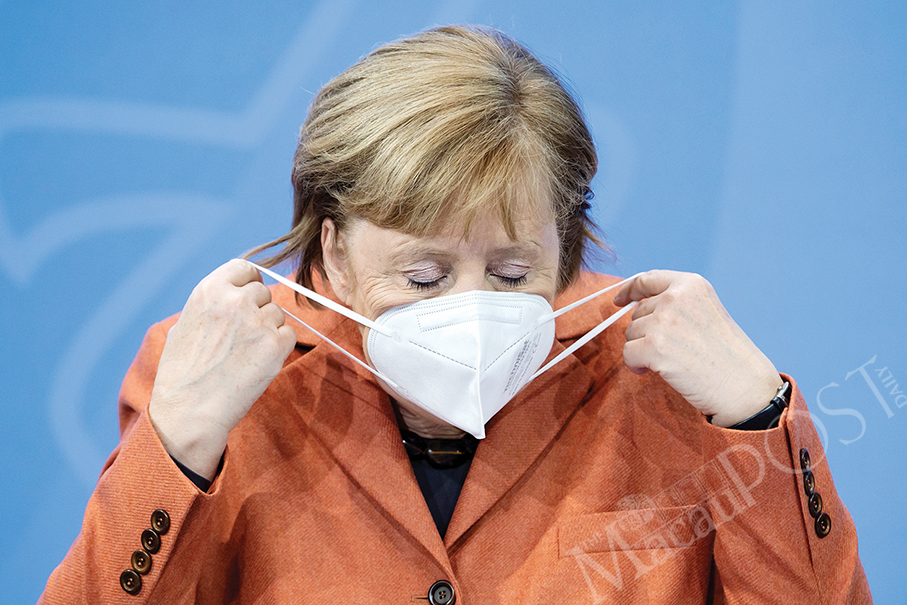Commentary by Hans-Georg Moeller*
Germany has become one of the epicentres of the COVID-10 pandemic. Just as daily cases have risen to a new record number of nearly 24,000, and the total death toll exceeds 22,000, Chancellor Angela Merkel presented a speech to the German parliament last Wednesday. Media outlets described it as her most emotional ever.
Approaching the Christmas season, Merkel proposed more lockdown and distancing measures sure to further frustrate the German population already suffering from the seemingly never-ending and continuously worsening crisis. Her unusually passionate appeal was certainly not only intended to motivate the Germans to accept new restrictions and regulations, but also to evoke the sympathy of the electorate and the media to shore up much needed political support. After all, she is facing a rising domestic protest movement against her policies which, on the one hand, have failed to rein in the pandemic and, on the other hand, could not prevent the deepest economic decline on record in post-war Germany.
In her speech to the German parliament, Merkel used an effective rhetorical strategy to direct public attention away from her failed policies. This strategy, widely applied by politicians seeing their popularity fading in times of COVID-19, replaces the biological threat of the virus – which Merkel was unable to combat – with a political threat that she claims to be shielding her country from. She described the reaction to the pandemic in terms of a “global competition of systems” pitching “liberal democracies,” as represented by Germany, against countries “resembling dictatorships” – a thinly veiled allusion to China. Different from such countries using strict “prohibitions” to control their populations, Germany was relying on the “responsible behaviour of each individual,” she said. Thereby she implied that while perhaps not beating the virus that quickly, Germany was making a case of protecting the rights of individuals and their dignity in times of crisis. This political us-versus-them rhetoric served to excuse Merkel’s unsuccessful pandemic response by portraying it as the lesser evil compared with allegedly dictatorial politics of other countries. While she may not have protected all Germans from COVID-19, she suggested, she had more importantly made sure that Germany remained a shining example of Western liberalism.
Merkel is a hugely experienced politician who has managed to hold on to power for about 15 years. It can be reasonably expected that she knows that her narrative of a “global competition of systems” in the fight against COVID-19 is just as much a politically convenient tool certain to charm the German electorate as it is a fairy-tale. It is not the case that it actually took dictatorial measures to successfully minimise the number of COVID-19 infections. First and foremost, it took measures such as temporary limited border closures, quarantine arrangements, or the tracking of infection chains. Such measures not only limited the spread of the virus in mainland China, but also in places like New Zealand, Singapore, Taiwan, or Macau, to name just a few – which can hardly all be called systemic competitors of Germany. Different from Germany, however, there was both a political and public will in each of these systemically highly diverse places to consequently implement said measures to prevent sick and elderly people from dying.
Merkel not only spreads “fake news” when setting up a stark contrast between “competing systems” as the political framework for the global fight against COVID-19. Moreover, she creates an appealing but false self-aggrandising story of a seemingly superior German way of defeating the virus through the “responsible behaviour of each individual.” Simply by looking at photos and video footage from Germany in the summer and fall of 2020 it becomes evident that a larger number of Germans did not bother wearing facemasks in public or maintaining adequate social distancing. A lot of Germans simply did not care – and many still don’t.
As Raina MacIntyre, head of the biosecurity research programme at the Kirby Institute at the University of New South Wales, was quoted by the South China Morning Post as saying: “Western countries are used to patronising low- and middle-income countries and perceive themselves as superior in every way, including disease control.”
Merkel’s arrogant suggestion that Germans differ from others by resisting COVID-19 due to the “responsible behaviour of each individual” is another variation of such patronising and assumed superiority. In “oriental” and other “despotisms,” Merkel’s speech implied, measures of disease control are only successful because of “dictatorial” regimes. She apparently does not expect that people there can have the same degree of “individual responsibility” as Germans.
If anything, Merkel’s speech to the German parliament proves that making politics today often does not consist in making political decisions that benefit a country or its citizens. Instead, it consists in offering popular narratives that allow these citizens to feel good about themselves. Merkel’s policies may have been unable to prevent tens of thousands of deaths and a deep recession in Germany. But she may succeed in convincing a large number of Germans of their own superiority in a supposed global systems-competition in the fight against COVID-19, as well as, most crucially, of their outstanding degree of individual responsibility.
*Professor, Department of Philosophy and Religious Studies
University of Macau (UM)

German Chancellor Angela Merkel puts off her facemask before a press conference following crunch talks via video conference with the heads of government of Germany’s 16 states on extending novel coronavirus restrictions, at the Chancellery in Berlin yesterday. Shops selling non-essential goods, hair salons and schools in Germany will close from Wednesday in order to halt, according to Merkel, the “exponential growth” in new COVID-19 infections in the EU’s biggest economy and most populous country. As of yesterday, Germany, which has a population of nearly 84 million, had 1.32 million confirmed cases including 22,171 deaths, according to worldometers.info.






